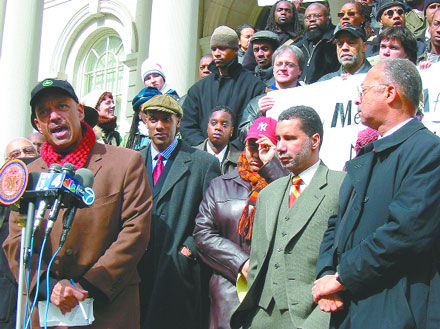Councilmember Philip Reed leads black elected officials, community groups at City Hall rally
On Sunday, March 14, in a move to express organized African American support for same-sex marriage, City Councilmember Philip Reed hosted a press conference that included community leaders and other elected officials on the steps of City Hall.
He was joined by city Comptroller William Thompson, state Senate Minority Leader David Paterson, Councilmember Bill Perkins, Tokes Osubu, executive director of Gay Men of African Descent (GMAD), Kim Ford, executive director of African Ancestral Lesbians United For Social Change (AALUSC), Keith Boykin, president of the National Black Justice Coalition, Rev. Zachary Jones, pastor of the Unity Fellowship Church in Brooklyn, and Michelle and Montel Cherry-Slack, lesbian domestic partners.
“Our concern is that oftentimes over the last couple of weeks, this debate has seemed to be focused essentially in the Caucasian or the white community,” said Reed, who is openly gay and represents portions of the Upper West Side, East Harlem, and the South Bronx. “We are here today to let people know that as gay men and women, as straights, as people who are identified as African Americans, we too are in this struggle.”
The event was attended by roughly 80 community members, most of whom stood on City Hall steps behind banners for GMAD and AALUSC.
Several speakers condemned the recent statement by President George W. Bush supporting a constitutional amendment to restrict marriage to the union of a man and a woman.
“The president has launched a very desperate, cynical, polarizing attack against this community for the sake of his pathetic attempts to get re-elected,” said Perkins, who represents West Harlem on the Council.
His sentiment was shared by Boykin, who said, “They want to divide us and use this issue as a weapon of mass distraction, so that they win their own cynical political objectives.”
There was a strong showing of community spirit, even among the elected officials, who at several points joked with one another and expressed personal camaraderie.
“I didn’t know about the thousand and forty-nine protections I had or I would have gotten married sooner,” quipped Paterson, referring to the legal rights and benefits married couples enjoy. “Maybe if this had come sooner, I might have married Phil Reed,” he added, to the amusement of Reed and the audience.
Paterson dedicated his remarks to his deceased godparents, a committed gay couple, whom he said were missed as “members of his family.”
Reed himself discussed the significance of ending legal restrictions on marriage in his own family. Drawing a comparison between the ban on same-sex marriage and anti-miscegenation laws, he declared that his parents, an interracial couple, were obliged to travel to Mexico to get married because their union was illegal in the United States. He then said that his mother, who was white, moved to New York City to raise her children because “this is the place that she felt she could find sanctuary” from discrimination.
The conflation of the struggle for gay equality with the black civil rights movement has drawn strong reactions from the black community for decades. Not only conservatives, but also some progressives, even among African American lesbians and gays, have objected to the comparison, calling it an oversimplification of the issues in both situations.
In the current push to strike down barriers to marriage equality, the comparison persists, with activists routinely invoking the history of segregation, “separate but equal,” the actions of Civil Rights figure Rosa Parks, and the repeal of anti-miscegenation laws to bolster their argument.
Press conference speakers made the comparison a strong rallying point.
“We are carrying on the legacy of that famous doctor, that famous reverend, who said discrimination is discrimination is discrimination,” said GMAD’s Osubu.
“Today, I am not three-fifths of a man, I am a total man,” said Unity Fellowship’s Jones, who leads a black gay and lesbian congregation in Brooklyn. He was referring to the “Three-fifths Compromise,” the pre-Civil War clause of the Constitution whereby enslaved blacks were counted as three-fifths of a human being for the purpose of determining southern states’ representation in Congress.
“Domestic partnership is only three-fifths of the law,” Jones said.
“It was the African American community that overturned Plessey vs. Ferguson and memorialized the concept that ‘separate but equal&Mac226; is never equal,’ said Reed, referring to the repeal of the 1896 Supreme Court ruling that stood as the cornerstone of racial segregation for more than half a century. “We see this direct correlation between the struggle that we continue to have as well as the new struggle that has manifested itself in terms of going to court.”
Although resolute in their support for winning same-sex marriage rights, speakers at the event did not specifically address the direct action at City Hall on March 4 in which demonstrators called on the city to issue licenses to gay and lesbian couples. Mayor Michael R. Bloomberg and City Clerk Victor Robles were not mentioned. Instead, speakers directed their comments to African American conservatives and the religious right.
“The religious right wants to use marriage as a divisive wedge issue to split blacks against progressives in 2004,” said Boykin, a former special assistant to President Bill Clinton. “We want the world to know that many African Americans do support marriage equality.”
Councilmembers who gave their written endorsement to the press conference, but were not present on Sunday, included Tracy Boyland, Yvette Clarke, and Letitia James of Brooklyn and Larry Seabrook of the Bronx.



































